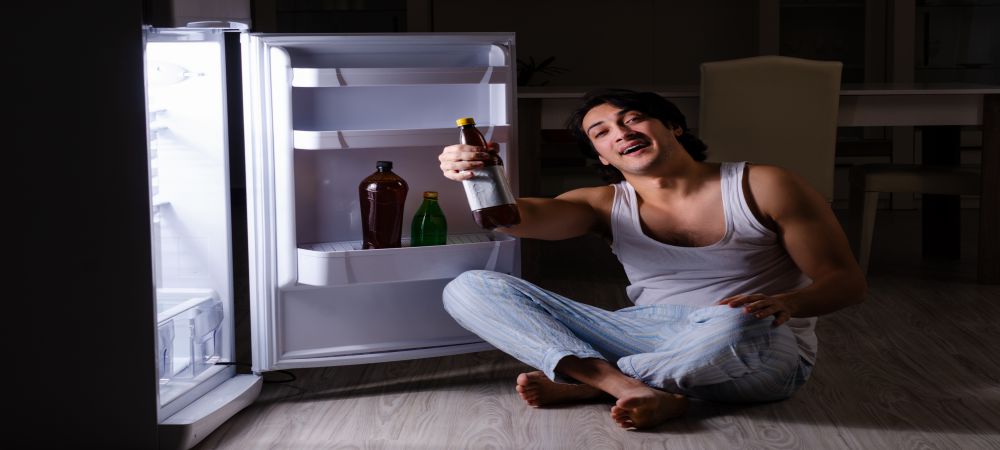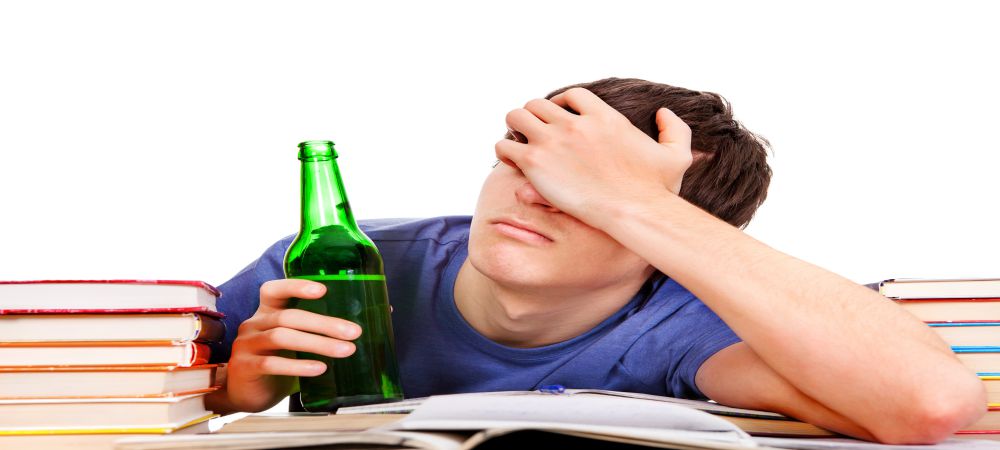
20 Warning Signs Of An Alcohol Drinking Problem
Around 80% of Canadians who are of legal drinking age consume alcohol. This number may seem high, but the majority of this alcohol consumption is within the bounds of what would be considered responsible.
Alcohol is a big part of life in Canada and around the world. It is a staple at most social gatherings for adults. It is used to celebrate milestones and accomplishments, or as a means to relax after a long day. If you are over the age of 19 and not notably inebriated, you can easily get your hands on some alcohol without spending enormous sums of money.
When Does Drinking Become “Too Much”?
Because of the availability and social acceptability of alcohol, it can be difficult to know when you have crossed the line from regular drinking to problem drinking.
Here are 20 signs that you or a loved one may have an alcohol drinking problem.
#1 You regularly exceed Canada’s low-risk alcohol drinking guidelines
According to Canada’s low-risk alcohol drinking guidelines, those assigned male at birth should consume no more than three drinks at a time and a total of 15 drinks per week, and those assigned female at birth should consume no more than two drinks at a time and a total of 10 drinks per week. These guidelines are based on averages: your safe alcohol limits may be different based on your age, weight, state of health, whether you are taking any medications, and any prior history of substance abuse.
#2 You experience cravings for alcohol
Most people who consume alcohol do not experience cravings. If you are consuming alcohol frequently, you may start to experience an overwhelming desire to drink. This can set in hours, days, or even weeks after the last consumption of alcohol. For many people, the only way to get rid of this craving is by drinking alcohol.
#3 You are hiding your alcohol consumption from friends and family members
If you are doing anything to hide your alcohol consumption from the people who are close to you, you may have an alcohol drinking problem. For some people, this means physically hiding alcohol in strange places. For others, it means lying about how much alcohol is being consumed.
#4 You shift money around to finance your alcohol consumption
A single bottle of wine or six-pack of beer is fairly inexpensive. But if you are overusing alcohol on a regular basis, the cost starts to add up. You may find yourself moving money from one bank account to another, withdrawing larger amounts of cash, or using funds intended to pay bills to buy alcohol.
#5 Your alcohol consumption is getting in the way of your personal relationships
Most people don’t mind if their spouse or parent comes home from work and cracks open a beer. But if your drinking starts to cut into family time or make you behave aggressively toward your loved ones, your relationships may start to suffer. As alcohol occupies an ever-increasing part of your life, it may drive a wedge between you and the people you love.
#6 Your alcohol consumption is getting in the way of work or school
Alcohol can affect your professional life in several ways. Perhaps you have fallen into a habit of calling in sick to work – or asking someone to do so on your behalf – because of a hangover. Or maybe you have started showing up late. For some people, alcohol consumption extends into work or school hours, leading to declines in performance. If alcohol is regularly preventing you from performing at your best at work or school, it may be time to look at your consumption.
#7 You cancel social plans because they get in the way of your drinking
For most people, alcohol is a way of being social. We go to a gathering or a celebration, and it’s the most natural thing in the world to have a drink. Once alcohol dependence takes hold, though, the opposite starts to happen. You may start avoiding these gatherings because you don’t want people to see how much alcohol you are consuming. You would rather be alone so you can drink as much as you like without having to worry about social decorum.
#8 You buy alcohol from multiple retailers to avoid recognition
People who consume alcohol moderately or lightly can visit their local alcohol retailer without a second thought. If you are drinking large amounts of alcohol each day – and therefore having to replenish it – you may start to worry that the staff at your regular liquor outlet will notice your excessive purchases. A lot of people with alcohol addictions rotate between retailers to avoid suspicion.
#9 You cannot quit alcohol in spite of attempts to do so
Nobody picks up an alcoholic beverage with the intention of becoming addicted to alcohol. On the contrary, people in the early stages of alcohol addiction often have an awareness that they are drinking too much, and they decide to either quit or embark on a period of abstinence. The cravings may prove to be too overwhelming to handle, though, resulting in a relapse.
#10 You consume alcohol at times that are not considered socially acceptable
Most societies have evolved in such a way that “normal” consumption of alcohol is reserved for specific times. For instance, it is acceptable to have a drink in the evening, when the day’s work is done, but not in the morning. It is fine to drink at a gathering of adults, but not at a child’s birthday party. If you are starting to break those unwritten rules – for example, if you are drinking upon waking up or while driving to work – your alcohol consumption may be problematic.
#11 You experience withdrawal symptoms when you are not drinking
If you overuse alcohol regularly over a prolonged period of time, you may start to experience withdrawal symptoms when you’re not drinking. The severity of symptoms depends on several factors, including the frequency and amounts of alcohol consumption. Symptoms range from mild anxiety and irritability to high blood pressure and seizures.
#12 You are drinking progressively more alcohol
Sometimes people drink alcohol not for the simple enjoyment of it, but to achieve the effects it produces: confidence, relaxation, an escape from stress. The more frequently you drink, the more you have to consume in one sitting in order to achieve those effects. If your alcohol consumption is creeping up, you may have started to develop that tolerance.
#13 You are unable to control the number of drinks you have
One of the hallmarks of alcohol addiction is that it renders you incapable of controlling your consumption. You may go to a social gathering intending to have just one or two drinks, but after one or two drinks you may think, “Just one more”. Before you know it, you’ve had several drinks and you are unable to stop.
#14 You engage in potentially risky behaviour when you have been drinking
Alcohol lowers your inhibitions and numbs your sense of danger. These two effects can result in you doing things under the influence of alcohol that you would never consider while sober. The obvious example is impaired driving, but you may also perform dangerous stunts, engage in criminal activity, or engage in high-risk sexual behaviour.
#15 You are losing interest in previously enjoyed activities
As alcohol starts to take over your life, you may gradually stop participating in things you previously enjoyed. To begin with, you may back out of the occasional engagement or take longer to read a book or complete a drawing. But before long, your hobbies and interests may be all but abandoned, either because you would rather spend the time drinking, or because ongoing use of alcohol is affecting your motivation and mental health.
#16 You feel anxious or aggravated when you do not have easy access to alcohol
The more you drink, the more you need to drink. If your body and mind have become accustomed to receiving alcohol, they may revolt when you try to abstain. If you are craving a drink and you don’t have alcohol available to you, you may become agitated and anxious.
#17 Friends or family members have asked you to stop drinking
Alcohol abuse does not only affect the person who is drinking – it also affects family members and close friends. Your loved ones may be feeling the effects of a disintegrating relationship, or they may be concerned for your wellbeing when they approach you and ask you to stop drinking.
#18 You have started neglecting your personal health and hygiene
Alcohol abuse often goes hand-in-hand with declining self-care. If you are no longer maintaining basic hygiene, you have stopped exercising, or you have abandoned healthy eating, you should seek help as soon as possible. Addiction is hard on the body, and the sooner you can return to a state of physical health, the sooner you can focus on addiction recovery.
#19 You are experiencing legal problems as a result of alcohol consumption
People do strange things when they have been drinking, and some of these can lead to legal trouble. Being pulled over for impaired driving or having to go to court because of alcohol-induced criminal activity are signs that your alcohol consumption is a problem.
#20 You are questioning whether you have an alcohol drinking problem
Human beings are intuitive. We usually have a good sense of when something is not right within ourselves. If you are spending a lot of time wondering if you have an alcohol drinking problem, something in your behaviour has led you to ask this question. That alone could be a sign that you need to seek help.
Alcohol Addiction Help Is Within Your Reach
No matter where you are in your alcohol addiction journey, Thousand Islands Rehab Centre is ready to welcome you. We offer customized alcohol addiction treatment programs that respect your physical, mental, emotional, spiritual, cultural, and social needs. As a top addiction rehab, we will guide you through your recovery journey, from detox and rehab, right through to aftercare. Call us today to learn more or to reserve your spot.




